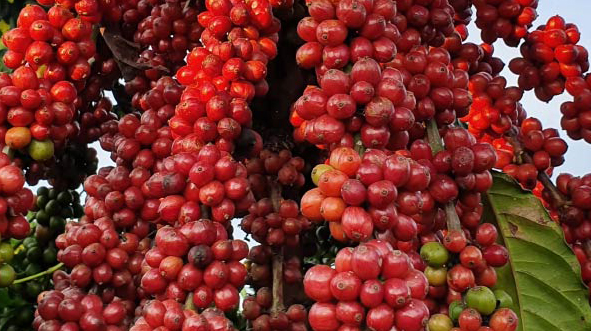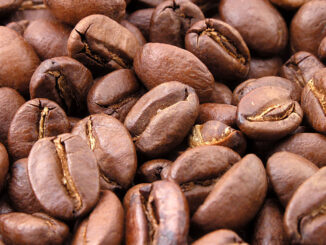
The Robusta coffee variety (Coffea canephora) is one of the most significant and widely cultivated coffee species on Earth.
Known for its bold flavor, high caffeine content, and remarkable resistance, Robusta plays a crucial role in the global coffee industry, especially in blends, instant coffee, and espresso production.
Accounting for around 40% of the world’s coffee output, Robusta is second only to Arabica — but is increasingly recognized for its strength, reliability, and adaptability.
🌍 Origin and History
Coffea canephora — commonly known as Robusta — originates from the tropical forests of Central and West Africa, particularly in regions of Uganda, the Democratic Republic of Congo, and Ivory Coast.
It was scientifically identified in 1897, much later than Arabica, but quickly became important when coffee leaf rust devastated Arabica plantations in Asia in the late 19th century.
Robusta was introduced to Southeast Asia (especially Vietnam, Indonesia, and India) because of its natural resistance to pests and diseases.
Today, it forms the backbone of mass coffee production and is key to sustainable coffee farming in the tropics.
🌿 Botanical Characteristics
The Robusta plant is hardy, vigorous, and highly productive.
It grows faster than Arabica and thrives in environments that would stress or kill other coffee species.
Main characteristics:
- Tree height: 4–6 meters
- Leaves: Broad, dark green, and glossy
- Cherries: Round, medium-sized, ripen uniformly
- Beans: Small, round, dense with a straight crease
- Caffeine content: 2.2–2.7% (almost double that of Arabica)
- Root system: Deep and fibrous, highly drought-resistant
Robusta’s biological strength makes it ideal for lowland tropical regions with higher temperatures and humidity.
☕ Flavor Profile
Robusta coffee is known for its bold, earthy, and intense taste, offering a completely different flavor experience from Arabica.
It is commonly used to add depth, crema, and strength to espresso blends.
Typical tasting notes:
- Full body and thick texture
- Low acidity
- Strong, bitter-sweet flavor
- Notes of dark chocolate, wood, nuts, and spices
- Heavy crema when brewed as espresso
While Arabica is associated with sweetness and complexity, Robusta delivers power, caffeine, and consistency — essential traits for commercial and specialty roasters alike.
🌱 Ideal Growing Conditions
Robusta thrives in tropical lowland climates where temperatures are too warm for Arabica.
Optimal conditions:
- Altitude: 200–800 meters
- Temperature: 22–32°C
- Rainfall: 1,500–2,500 mm per year
- Soil: Deep, well-drained, slightly acidic (pH 5.5–6.5)
- Shade: Prefers light shade and humidity
These growing conditions make Robusta the preferred crop for Africa, Southeast Asia, and South America’s tropical regions.
🌾 Agricultural Advantages
✅ Highly resistant to pests and coffee leaf rust
✅ Tolerant to heat, humidity, and varying soil conditions
✅ High yield — more productive than Arabica
✅ Low production cost
✅ Fast growth and maturity
✅ Long lifespan
Because of these benefits, Robusta is a vital income source for millions of smallholder farmers worldwide.
⚠️ Challenges
❌ Flavor less refined than Arabica — more bitter and earthy
❌ Requires consistent moisture — sensitive to drought if prolonged
❌ Lower price in global markets due to perceived quality gap
❌ High caffeine content may deter some consumers
However, improved processing techniques (like washed Robusta) and selective breeding have significantly enhanced cup quality, closing the gap between Robusta and Arabica.
🧬 Major Robusta Varieties and Clones
Several improved Robusta varieties have been developed for yield, quality, and resilience:
- S.274 (India): High-yielding, smooth flavor, disease-resistant.
- CL 153 PXR (Pineapple × Rambung): Consistent bean size, rich taste.
- UG 5 (Uganda Robusta): Indigenous selection, strong resistance, full-bodied cup.
- Java Robusta: Early Asian cultivar with bold, earthy profile.
- Conilon (Brazil): Adapted to dry climates, used for commercial blends.
These selections form the foundation of modern Robusta cultivation across tropical regions.
🌍 Main Producing Regions
Today, Robusta is grown in over 50 countries, particularly in Africa and Asia.
The top producers include:
- Vietnam 🇻🇳 — world’s largest Robusta exporter
- Brazil 🇧🇷 — grows both Arabica and Conilon Robusta
- Indonesia 🇮🇩 — known for earthy, heavy-bodied Robustas
- India 🇮🇳 — produces high-quality Robusta (S.274, CxR, CL153)
- Uganda 🇺🇬 — home to wild Robusta forests and improved hybrids
These regions supply most of the world’s espresso and instant coffee industries.
☕ Robusta vs. Arabica
| Feature | Robusta (Coffea canephora) | Arabica (Coffea arabica) |
|---|---|---|
| Caffeine | 2.2–2.7% | 1.1–1.5% |
| Acidity | Low | High |
| Body | Full, thick | Smooth, medium |
| Flavor | Bitter, earthy, nutty | Sweet, fruity, floral |
| Altitude | 200–800 m | 800–2,000 m |
| Resistance | Very high | Moderate |
| Yield | Higher | Lower |
Robusta’s strength and reliability make it the industrial backbone of the coffee world, while Arabica dominates specialty markets.
🌍 Importance in the Coffee Industry
Robusta’s role goes beyond production — it ensures global coffee stability.
Its resilience makes it vital for adapting to climate change, while its affordability supports accessibility in consumer markets.
Robusta is essential for:
- Espresso blends — adds crema and intensity
- Instant coffee — dissolves easily with strong flavor
- Energy and canned coffees — valued for caffeine strength
- Hybrid breeding programs — parent species for Arabusta and CxR hybrids
Without Robusta, the global coffee supply would be less stable and far less sustainable.
❤️ Final Thoughts
The Robusta coffee variety (Coffea canephora) is a pillar of the coffee world — strong, resilient, and indispensable.
It fuels billions of cups daily, supports millions of farmers, and forms the foundation for coffee’s future sustainability.
Though often overshadowed by Arabica, Robusta’s bold character, adaptability, and power make it one of the most important coffee varieties on Earth.
☕ Robusta coffee — strong in flavor, stronger in spirit.
DeliciousPath: Enjoyment in Every Moment
Explore the Gourmet on Board category for exquisite flavors that elevate your meals, even when you’re on a boat, and the Coffee category for aromatic coffee blends that make every moment special. DeliciousPath is here to turn every experience into something unforgettable!
























